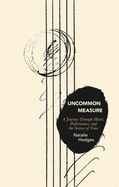
In her fascinating debut, Uncommon Measure: A Journey Through Music, Performance, and the Science of Time, violinist Natalie Hodges presents an accessible memoir in essays that bridge the time-space continuum in musical terms. "If you want to change the past, all you have to do is try to record what happened in it," she writes.
Hodges weaves her themes through the full work, disparate as they may seem at first. Her discussion of time's relationship to the way humans experience it will be recognizable to all, the way those looming challenges (or measures) make the moments before them fly by, and time stops once they are reached--in Hodges's case, literally, bow to floor, fingers plucking the violin's strings to complete the piece and exit the stage.
She also argues that no time is ever lost, no experience wasted. Learning to dance the tango helps Hodges understand how improvisation can work and how to trust the idea of prescience, knowing what her partner on the dance floor or fellow musicians are about to do--step or play or pause. Her description of Johann Sebastian Bach's Chaconne invites readers to listen as a violinist would. She pays tribute to her Korean immigrant mother and posits an enlightening suggestion to think of cultural "assimilation" in terms of symmetry rather than equality. It's a book to savor. The ideas are dense; readers will want to pause and digest them. They offer a way to see the world anew, to reframe experience, the way Hodges has come to understand her own: from the inside out. --Jennifer M. Brown, senior editor, Shelf Awareness

